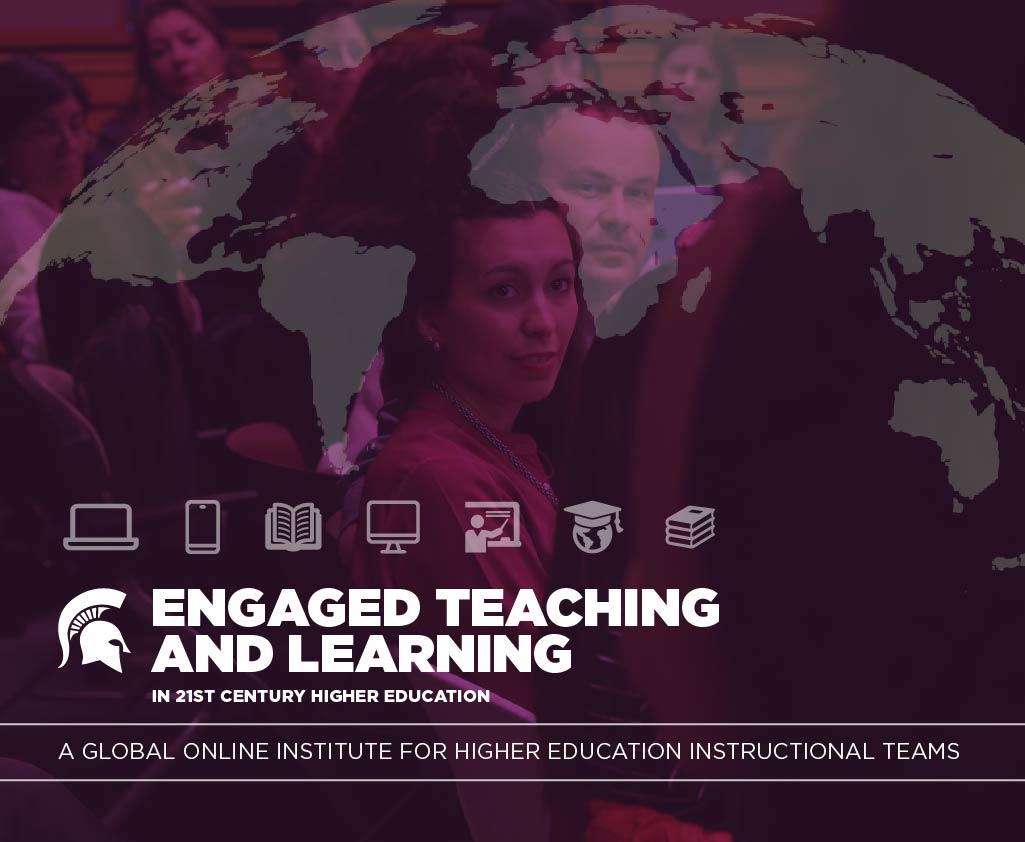Higher education institutions around the world are being asked to make student learning more active and relevant. What does that mean for instruction? How can instructors transform their teaching? How can research inform new practices in ways that are practicable in your own setting?
We invite lecturers, instructors, professors, curriculum designers, and higher education administrators to join an innovative, online professional learning program. This program introduces participants to innovations in teaching, and builds their capacity to rethink and revise their curricular and instructional practices. It offers an opportunity for teams of colleagues to explore and apply new methods of pedagogy and assessment in their institutions.
Please contact Dr. Julie Sinclair at sincla53@msu.edu if you have any questions.
Two live Question and Answer sessions available for those interested. See below for more information.
Registration
The registration and payment portal is open. This portal is for individual registration and payment. If you would like to register and pay for a group, please write to Christine Caster, caster@msu.edu for assistance. Upon registration, you will be issued a confirmation and a link to a survey collecting information about your experience and goals for the program. This is essential for our planning to make sure we’re meeting your needs.
Program Information
- Transform your teaching with cutting edge pedagogies that support student engagement and active learning, including discussion-based, hands-on, community-based, and online pedagogies
- Ground your teaching in theories of engaged learning, motivation, and adult learning
- Network with peers from around the world to consider how these new ways of working can be adapted for your own context
- Explore how universities can support new forms of teaching and learning
- Learn how assessment can be used to further student learning
The Online Institute is specifically designed to provide an environment for learning with others:
- You will be invited to join the course with a team of 2-4 instructors from your own institution, working on a common project situated in your context
- You will have the opportunity to network with counterparts to compare methods and contexts with other teams of higher education colleagues from around the world
- This interactional work is facilitated by MSU faculty, graduate students, and alumni, drawing on MSU’s longstanding commitment to reciprocal relation-building
- Instructional formats will include synchronous sessions with leading researchers and distinguished teachers from MSU, as well as asynchronous sessions that allow participants to work on their own and with a community of peers
- Because our participants come from a range of language backgrounds, all presentations and resources will be in English

Each module making up the program will include explicit discussion of the translational work required to adapt research-informed practices to best serve particular programs, and opportunities for reflection and application.
All participants will take part in the four-week intensive professional development program; teams also have the option of signing up for an extended opportunity for team-specific pedagogical coaching over the following semester.
The following list illustrates some of the range of faculty who will be contributing to the institute:
The program will include a blend of synchronous and asynchronous learning opportunities. Much of the programming is asynchronous to allow participants to work around their own schedule constraints. Short videos and readings by MSU faculty will introduce each topic. Participants will interact on discussion boards and share their experiences and their questions. These posts will prompt further videos and readings to address specific areas of interest, chosen by MSU facilitators. Participants may choose among these readings and activities.
Eight synchronous meetings held over the four and a half weeks will provide opportunities for live discussions among participants and MSU faculty and graduate students, while institutional teams are expected to make time to work together independently. Synchronous meetings will be scheduled to accommodate participants in different time zones and will be recorded for viewing by those who cannot make them.
- Intro to course – how the site works, the weekly schedule, expectations
- Principles of adult learning
- Foundational principles of motivation and engaged learning
- Examples of engaged pedagogies:
- Class discussion as an example of encouraging active participation in learning
- Problem/project-based learning as a framework for designing experiences in STEM and other areas
- Challenges in implementing interactive pedagogies – tradition, large class sizes, etc.
- Pedagogies:
- Community-engaged learning
- Online pedagogies that engage students
- Institutional supports for engaged learning
- Formative assessment as learning
- Evaluating the impact of changes in curriculum and pedagogy
- The role of cultural, institutional, and curriculum context on choosing and translating innovation to maximize student learning